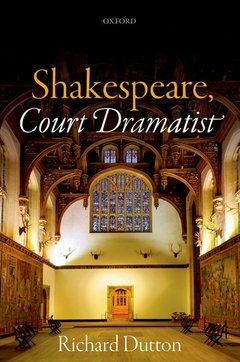Description
Shakespeare, Court Dramatist
Author: Dutton Richard
Language: English
Publication date: 04-2016
334 p. · 16.7x24 cm · Hardback
334 p. · 16.7x24 cm · Hardback
Description
/li>Biography
/li>
Shakespeare, Court Dramatist centres around the contention that the courts of both Elizabeth I and James I loomed much larger in Shakespeare's creative life than is usually appreciated. Richard Dutton argues that many, perhaps most, of Shakespeare's plays have survived in versions adapted for court presentation, where length was no object (and indeed encouraged) and rhetorical virtuosity was appreciated. The first half of the study examines the court's patronage of the theatre during Shakespeare's lifetime and the crucial role of its Masters of the Revels, who supervised all performances there (as well as censoring plays for public performance). Dutton examines the emergence of the Lord Chamberlain's Men and the King's Men, to whom Shakespeare was attached as their 'ordinary poet', and reviews what is known about the revision of plays in the early modern period. The second half of the study focuses in detail on six of Shakespeare's plays which exist in shorter, less polished texts as well as longer, more familiar ones: Henry VI Part II and III, Romeo and Juliet, Henry V, Hamlet, and The Merry Wives of Windsor. Dutton argues that they are not cut down from those familiar versions, but poorly reported originals which Shakespeare revised for court performance into what we know best today. More localized revisions in such plays as Titus Andronicus, Richard II, and Henry IV Part II can also best be explained in this context. The court, Richard Dutton argues, is what made Shakespeare Shakespeare.
Richard Dutton was educated at King's College, Cambridge and the University of Nottingham. He taught for many years at Lancaster University. Since 2003 he has been Humanities Distinguished Professor of English at The Ohio State University, where he served as chair of the English department from 2009 to 2013. He has published numerous monographs, scholarly editions, and edited collections relating to the early modern period, mostly focusing on the censorship of the drama, the authors Shakespeare and Ben Jonson, and theatre history.
© 2024 LAVOISIER S.A.S.
These books may interest you

Shakespeare's Early Tragedies 53.83 €



